牛津版小学六年级英语
上海版牛津英语六年级(上下)全重点
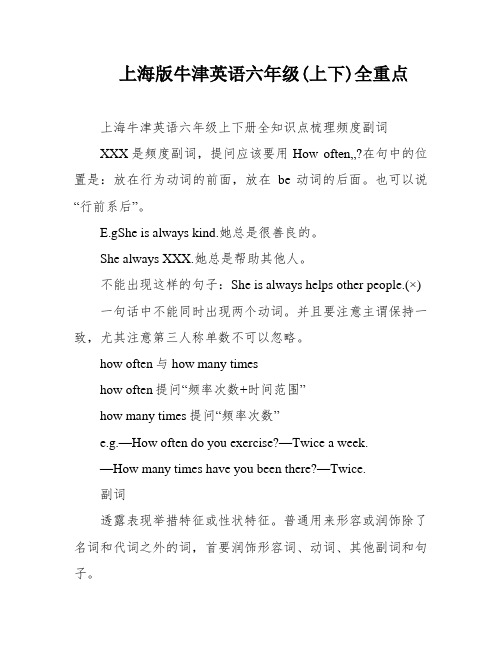
上海版牛津英语六年级(上下)全重点上海牛津英语六年级上下册全知识点梳理频度副词XXX是频度副词,提问应该要用How often…?在句中的位置是:放在行为动词的前面,放在be动词的后面。
也可以说“行前系后”。
E.gShe is always kind.她总是很善良的。
She always XXX.她总是帮助其他人。
不能出现这样的句子:She is always helps other people.(×) 一句话中不能同时出现两个动词。
并且要注意主谓保持一致,尤其注意第三人称单数不可以忽略。
how often与how many timeshow often提问“频率次数+时间范围”how many times提问“频率次数”e.g.—How often do you exercise?—Twice a week.—How many times have you been there?—Twice.副词透露表现举措特征或性状特征。
普通用来形容或润饰除了名词和代词之外的词,首要润饰形容词、动词、其他副词和句子。
XXX happy.(修饰形容词)The old lady is XXX.(修饰动词)Luckily, he got the first prize.(润饰句子)形容词后面+ly组成副词:slow—slowlyslight—XXX—luckilyhappy—happily介词What else do you do with your…?你和你的…还干什么?With是个介词,后面接人称代词时,要用宾格的形式。
With me/him/her/it/us /them在详细的某一楼层只能用介词on,而且第几层还要用序数词On the ground floor, on the first floor, on the XXX详细的某一天介词只能用onOn Sunday, On Sunday morning,On the Open Dayhe one on the left/right左边/右边的这个the one in the middle中间的这个如果是介词短语修饰the one,应该要放在the one后面,如果是形容词应放the one的中间the left/right onethe middle oneXXX XXX在周末目前完成时现在完成时的构成是:have/has +动词的过去分词。
牛津英语六年级知识点总结
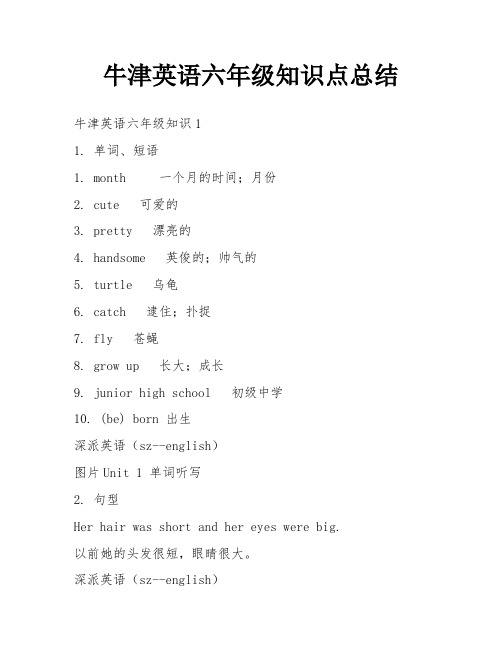
牛津英语六年级知识点总结牛津英语六年级知识11. 单词、短语1. month 一个月的时间;月份2. cute 可爱的3. pretty 漂亮的4. handsome 英俊的;帅气的5. turtle 乌龟6. catch 逮住;扑捉7. fly 苍蝇8. grow up 长大;成长9. junior high school 初级中学10. (be) born 出生深派英语(sz--english)图片Unit 1 单词听写2. 句型Her hair was short and her eyes were big.以前她的头发很短,眼睛很大。
深派英语(sz--english)图片Unit 1 Lisen and say 听写图片Unit 1 Read a story 听写3. 重难点1.一般过去时表示过去某个时间里发生的动作,常和表示过去的时间状语连用,如:yesterday,last night,this morning,in 1990,ago,since 1999,last(week,year,night,month...)等。
2.过去式顺口溜动词一般过去时,表示过去发生的事;一般动词加ed,若是特殊得硬记;be 用was 或用were,have,has变had;谓语动词过去式,过去时间做标志;否定句很简单,主语之后didn't添;疑问句也不难,did放在主语前。
牛津英语六年级知识21. 单词、短语1. famous 著名的;出名的2. during 在......期间3. spend 度过4. everyone 每个人;所有人5. countryside 乡村;农村6. pick 采摘7. summer holiday 暑假深派英语(sz--english)图片Unit 2 单词听写2. 句型1. How was your summer holiday?你的暑假过得怎样?2. It was wonderful!We went to the Great Wall.非常棒!我们去了长城。
小学英语六年级牛津版Reusing old things
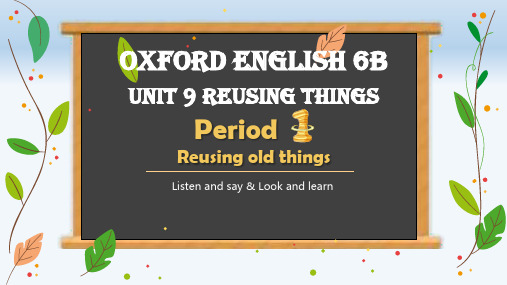
Share your ideas
We can reuse _________________ . We can ______________________. We can put ___________ in_____ . Then it’ll be __________________. It’s__________.(useful/beautiful/…)
it.
lamp
We can put __s_o_m_e__p_la_n_t_s_____in it. Then it’ll be a __________.
Then it’ll be a __p_l_a_n_t _p_o_t ______.
Listen and read
We can put some flowers in this bottle.
Then it’ll be a vase.
That’s right.
Listen and say
We can reuse other old things too. Do you have any ideas, Alice?
Yes. Look at this_______b_ig_c_a_n_____________. I can put __m_y_p_e_n_s_, _pe_n_c_il_s_a_n_d_r_u_le_r_s_____ in it. It’s the right size! It’ll be a__n_ic_e__pe_n__h_ol_d_e_r___.
Oxford English 6B
小学英语牛津深圳版六年级上册知识点总结
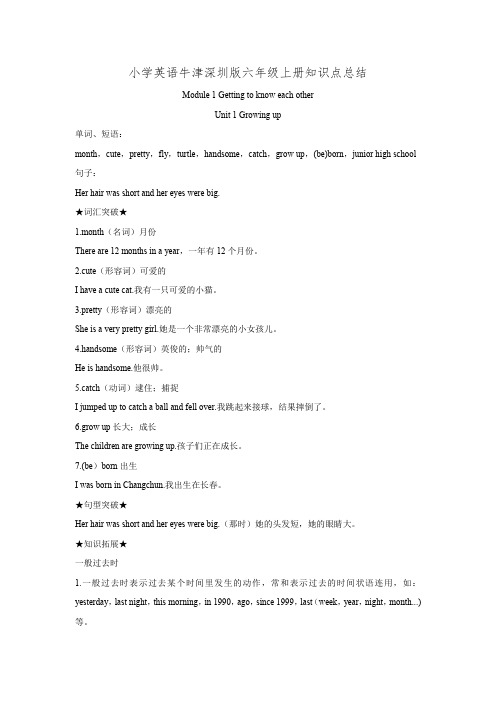
小学英语牛津深圳版六年级上册知识点总结Module 1 Getting to know each otherUnit 1 Growing up单词、短语:month,cute,pretty,fly,turtle,handsome,catch,grow up,(be)born,junior high school 句子:Her hair was short and her eyes were big.★词汇突破★1.month(名词)月份There are 12 months in a year,一年有12个月份。
2.cute(形容词)可爱的I have a cute cat.我有一只可爱的小猫。
3.pretty(形容词)漂亮的She is a very pretty girl.她是一个非常漂亮的小女孩儿。
4.handsome(形容词)英俊的;帅气的He is handsome.他很帅。
5.catch(动词)逮住;捕捉I jumped up to catch a ball and fell over.我跳起来接球,结果摔倒了。
6.grow up长大;成长The children are growing up.孩子们正在成长。
7.(be)born出生I was born in Changchun.我出生在长春。
★句型突破★Her hair was short and her eyes were big.(那时)她的头发短,她的眼睛大。
★知识拓展★一般过去时1.一般过去时表示过去某个时间里发生的动作,常和表示过去的时间状语连用,如:yesterday,last night,this morning,in 1990,ago,since 1999,last(week,year,night,month...)等。
2.下面的歌谣可以帮助你理解一般过去时,快来读一读吧!动词一般过去时,表示过去发生的事;一般动词加ed,若是特殊得硬记;be 用was 或用were,have,has变had;谓语动词过去式,过去时间做标志;否定句很简单,主语之后didn't添;疑问句也不难,did放在主语前。
新沪教牛津版六年级下册小学英语全册单元知识点小结
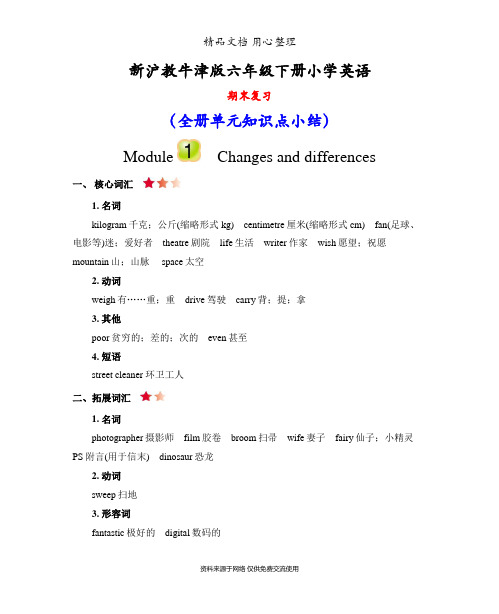
新沪教牛津版六年级下册小学英语期末复习(全册单元知识点小结)Module Changes and differences一、核心词汇1. 名词kilogram千克;公斤(缩略形式kg)centimetre厘米(缩略形式cm)fan(足球、电影等)迷;爱好者theatre剧院life生活writer作家wish愿望;祝愿mountain山;山脉space太空2. 动词weigh有……重;重drive驾驶carry背;提;拿3. 其他poor贫穷的;差的;次的even甚至4. 短语street cleaner 环卫工人二、拓展词汇1. 名词photographer摄影师film胶卷broom扫帚wife妻子fairy仙子;小精灵PS附言(用于信末)dinosaur恐龙2. 动词sweep扫地3. 形容词fantastic极好的digital数码的4. 副词online在线地;在线的5. 代词themselves他们自己;她们自己;它们自己6. 其他taller更高的7. 短语go fishing去钓鱼enjoy oneself玩得愉快;得到乐趣get … in收割street sweeper扫地车by hand用手right away立即;马上in a short time很快head teacher 校长 a piece of一张;一片have a picnic去野餐better and better越来越好三、核心句型1. I’m 150 centimetres tall. 我身高150厘米。
解读:这是介绍身高的句型。
“主语 + be动词 + 数字 + 长度单位(+ tall).”可以用来介绍某人的身高。
举一反三: My cousin is 154 centimetres tall. 我的堂弟身高154厘米。
Jim is 149 centimetres tall. 吉姆身高149厘米。
2. There are a lot of tall buildings in the city. 城市里有很多高大的建筑物。
2024年牛津版英语小学六年级上学期自测试卷与参考答案
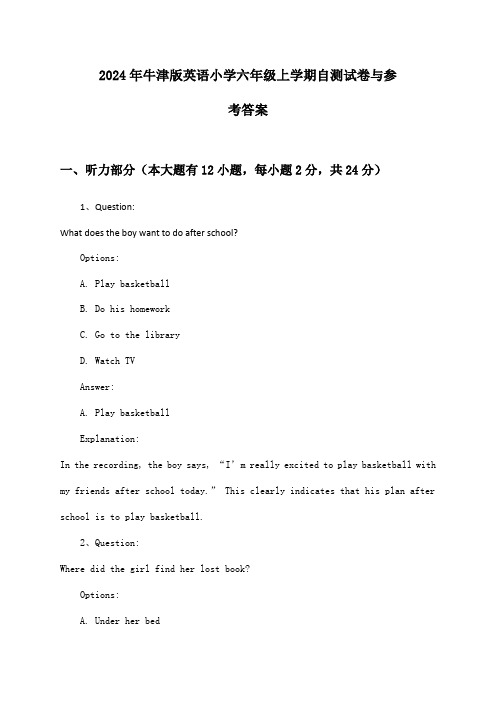
2024年牛津版英语小学六年级上学期自测试卷与参考答案一、听力部分(本大题有12小题,每小题2分,共24分)1、Question:What does the boy want to do after school?Options:A. Play basketballB. Do his homeworkC. Go to the libraryD. Watch TVAnswer:A. Play basketballExplanation:In the recording, the boy says, “I’m really excited to play basketball with my friends after school today.” This clearly indicates that his plan after school is to play basketball.2、Question:Where did the girl find her lost book?Options:A. Under her bedB. In the classroomC. On the bookshelfD. In her backpackAnswer:B. In the classroomExplanation:The girl mentions in the recording, “I finally found my book. It was right there on my desk in the classroom.” This statement directly tells us that she f ound her lost book in the classroom.Note: Ensure to listen to the recordings provided by your teacher to accurately answer these questions. The explanations are based on the content typically found in such listening exercises.3、Listen to the dialogue between two friends talking about their weekend plans. What is Sarah going to do on Saturday afternoon?A. Go to the moviesB. Visit her grandparentsC. Play tennis with TomAnswer: C. Play tennis with Tom.Explanation: In the dialogue, Sarah mentions that she has a tennis match with Tom scheduled for Saturday afternoon, which makes option C the correct answer.4、You will hear a short passage about a boy’s day at school. What subjectdid he find most challenging today?A. MathematicsB. English LiteratureC. Science ExperimentAnswer: A. Mathematics.Explanation: The passage states that although the boy enjoyed his day, he found solving math problems during his mathematics class particularly difficult, indicating that mathematics was the most challenging subject for him today.5.Listen to a short conversation between a teacher and a student. What does the teacher ask the student to do?Options:A. Finish the homeworkB. Clean the blackboardC. Hand in the assignmentD. Come to the officeAnswer: C. Hand in the assignmentExplanation: In the conversation, the teacher specifically mentions that the student needs to submit their assignment by the end of the day. The other options are not mentioned, making option C the correct choice.6.Listen to a short passage about a school event. What is the main purpose of the event?Options:A. To raise funds for a new libraryB. To celebrate the school’s anniversaryC. To promote environmental awarenessD. To honor outstanding studentsAnswer: B. To celebrate the school’s a nniversaryExplanation: The passage describes various activities and preparations being made for the school’s anniversary celebration. While it may mention other activities, the primary focus is on the anniversary celebration, making option B the correct answer. The other options, though potentially relevant in different contexts, are not the main focus of this particular event.7、What does Sarah plan to do after school today?•A) Go to the library•B) Play soccer•C) Visit her friendAnswer: B) Play soccerExplanation: In the dialogue, Sarah mentions that she has finished all her homework and is free to join her friends for a game of soccer after school. Therefore, the correct answer is B.8、How many books did the boy borrow from the library?•A) Two•B) Three•C) FourAnswer: A) TwoExplanation: During the passage, the librarian states that the boy can only borrow two books at a time according to the library rules, and he chose two books on science. Hence, the correct answer is A.Mock Listening Scripts:For Question 7:Sarah: “Hey, I’m done with my homework, so I’ll be free to play soccer with you guys after school.”Friend: “Great! We’re glad you can join us.”For Question 8:Boy: “I would like to borrow these three books, please.”Librarian: “I’m sorry, but a ccording to our rules, you can only take out two books at a time. Which ones would you like?”Boy: “Oh, okay. Then I’ll just take these two about science experiments.”9.Listen to the dialogue between a teacher and a student. What does the teacher suggest the student do to improve their English?Options:A. Read more English booksB. Watch English moviesC. Practice speaking with friendsD. Join an English clubAnswer: CExplanation: In the dialogue, the teacher mentions that practicing speakingwith friends can help the student become more confident and improve their fluency. The other options, while also beneficial, are not specifically suggested by the teacher in this context.10.Listen to the short passage about a school event. What is the main purpose of the event?Options:A. To raise funds for a new libraryB. To celebrate the school’s anniversaryC. To promote environmental awarenessD. To showcase students’ talentsAnswer: BExplanation: The passage describes various activities and preparations being made for the school’s anniversary celebration. It mentions decorations, special performances, and speeches about the school’s history, indicating that the main purpose is to celebrate the school’s anniversary. The other options are not mentioned as the primary focus of the event.Instructions for Listening:•Listen carefully to each dialogue or passage.•Note down key information that helps you determine the correct answer.•Choose the option that best fits the context provided in the audio.Note: Ensure to play the corresponding audio clips for students to listen to before they attempt to answer these questions.11、Listen to the dialogue and choose the correct answer.(听力对话略)A)They are going to the zoo.B)They are going to the park.C)They are going to the museum.Answer: A) They are going to the zoo.Explanation: The dialogue mentions that the speakers are discussing their plans for the weekend and one of them suggests going to the zoo. The other speaker agrees, indicating that they are going to the zoo.12、Listen to the short passage and answer the question.(听力短文略)Question: What is the main topic of the passage?A) A description of a beautiful city.B)The importance of reading books.C) A review of a new movie.Answer: B) The importance of reading books.Explanation: The passage discusses the benefits of reading books, how it helps broaden our horizons, and the pleasure it brings. It does not mention a city or a movie review, making option B the most relevant answer.二、选择题(本大题有12小题,每小题2分,共24分)1.What is the correct form of the verb in the blank?“She usually_______(go) to school by bus.”A. goB. goesC. goingD. goneAnswer: BExplanation: The sentence is in the present simple tense, and the subject “she” is third person singular. Therefore, the verb “go” should be in its third person singular form, which is “goes.”2.Choose the correct word to complete the sentence:“The cat is_______under the table.”A. sleepB. sleepsC. sleepingD. sleptAnswer: CExplanation: The sentence describes an ongoing action, which requires the present continuous tense. The correct form of the verb “sleep” in the present continuous tense is “sleeping.”3、Which of the following sentences uses a past tense verb correctly?A) She go to the store yesterday.B) They seen the movie last week.C) He played football after school.D) I meet my friend earlier today.Answer: C) He played football after school.Explanation: The correct form in the past tense is used in option C. “Played” is the past tense of “play,” which fits well with the sentence. Options A, B, and D use incorrect forms or tenses of the verbs.4、Choose the correct pronoun to fill in the blank: “______ has eaten the last cookie.”A) HerB) HimC) ThemD) SheAnswer: D) SheExplanation: The sentence requires a subject pronoun that agrees with the singular verb “has eaten.” Among the choices, only “She” is a singular subject pronoun. The other options are either object pronouns or not appropriate in this context.5.What is the correct form of the verb in the blank?“By the time we arrived at the stadium, the game __________.”A) startB) startedC) had startedD) has startedAnswer: C) had startedExplanation: The sentence describes an action that was completed before anot her past action (“we arrived”). Therefore, the past perfect tense (“had started”) is used to indicate that the game started before they arrived.6.Choose the correct word to complete the sentence:“She was so__________in the book that she didn’t hear the doorbell ring.”A) interestingB) interestedC) interestD) interestsAnswer: B) interestedExplanation: The sentence requires an adjective to describe her state of being. “Interested” is the correct adjective form to indicate that she was engaged or absorb ed in the book. “Interesting” would describe the book itself, not her reaction to it.7、The boy____blue jeans is my brother.A. inB. atC. on答案:A解析:本题主要考查介词的用法和语义理解。
六年级上册英语沪教牛津版知识要点

Module1Getting to know each other一、核心词汇1.表示时间名词:month一个月的时间;月份yesterday昨天2.形容词:cute可爱的pretty漂亮的handsome英俊的;帅气的famous著名的;出名的healthy健康的;有益于健康的unhealthy不健康的;损害健康的3.动词:catch逮住;捕捉spend度过pick采摘4.食物名词:hamburger汉堡包fruit水果pie馅饼pizza比萨饼cola可乐sandwich三明治vegetable蔬菜chicken鸡肉chocolate巧克力5.表示动物名词:turtle乌龟fly苍蝇6.其他:during在……期间everyone每个人;所有人countryside乡村;农村7.核心词组:grow up长大;成长junior high school初级中学(be)born出生summer holiday暑假the Great Wall长城the Palace Museum故宫博物院Tian’an men Square天安门广场go swimming去游泳go to the museum去博物馆go to the cinema去电影院junior high school初级中学do my homework做我的家庭作业watch TV看电视visit my friends拜访我的朋友a little少量的fish and chips炸鱼薯条二、了解词汇1.一些动词及过去式:go(去)—went do(做)—didhave/has(有)—had watch(观看)—watchedvisit(访问;探望)—visited am/is(是)—was are(是)—were2.一些食物名词:egg鸡蛋bread面包noodles面条dumplings饺子3.其他:menu菜单三、核心句型1.Her hair was short and her eyes were big.她那时头发很短而且眼睛很大。
牛津版英语六年级上—U9同步—词汇整理—话题阅读—听力—作文

Part 1词汇语法复习(1)根据对应的音标和词性,写出单词的中英文6A U9 Vocabulary(牛津)序号英文音标词性中文1/fʌn/n.有趣的事2/’kəʊlə/n.可乐3/spaɪsɪ/adj.辛辣的4/nʌt/n.坚果5/’lemən/n.柠檬6/snæk/n.小吃;点心7/’sɔ:ltɪ/adj.咸的8/’tʃɪlɪ/n.辣椒9/’saʊə(r)/adj.酸的10/’bɪtə(r)/adj.苦的11/’teɪstɪ/adj..美味的12/dɪ’ lɪʃəs/adj.味道鲜美的13/spred/v.抹14/prɪ’ peə(r)/v.使做好准备;把…… 预备好15/ɪ’nʌf/adj.足够的(2)6A U9语法重难点1. plan1) v. 计划,打算plan to do sth. 计划做某事We _________ __________ hold a sports meeting next week. 我们计划下周举行运动会。
2) n. 计划What is your holiday _________? 你的假期计划是什么?1. 6A U9同步与提高2. fun n. 趣事(不可数名词)It is great _________ to go to the amusement parks. 去游乐园是件很有趣的事。
funny adj. 有趣的,滑稽的The cartoon characters in this film are very __________. 这部电影里的卡通人物很有趣。
3. sweet n. 糖果You shouldn’t eat too many _________. They’re bad for your teeth.你不应该吃太多糖果,那对你的牙齿不好。
sweet adj. 甜的I don’t like apples because they are too __________. 我不喜欢吃苹果,因为它们太甜了。
- 1、下载文档前请自行甄别文档内容的完整性,平台不提供额外的编辑、内容补充、找答案等附加服务。
- 2、"仅部分预览"的文档,不可在线预览部分如存在完整性等问题,可反馈申请退款(可完整预览的文档不适用该条件!)。
- 3、如文档侵犯您的权益,请联系客服反馈,我们会尽快为您处理(人工客服工作时间:9:00-18:30)。
六年级上U1: Public signs学习目标掌握现在进行时的构成及用法。
掌握情态动词must, should, can 的用法。
熟练运用祈使句。
主要知识点●现在进行时结构:现在进行时表示现在正在进行或发生的动作,其结构为:主语+ be (am, is, are) + 现在分词+其他。
现在分词:现在进行时都要用到动词的-ing形式,即现在分词形式。
大多数动词的ing形式是直接在动词词尾+ing;以不发音的e 结尾的动词的ing 形式是去掉e 再加ing。
●情态动词情态动词有:can, could, may, might, must, need, should 等。
一般情况下,情态动词后面跟动词原形。
should:表示应该,其否定是在后面直接加not 简写为shouldn't,表示“不应该、不应当”。
can:表示请求或许可时意为“可以”,can't 意为“不可以”。
must:表示必须要做的事情。
●祈使句祈使句有肯定句和否定句两种。
肯定式祈使句直接由“动词原形”开头,例如:Put on your hat. 戴上你的帽子。
否定式祈使句在谓语动词前面加don't,例如:Don't play here. 不可以在这里玩。
●禁止做某事时,尤其是用标语表示时,我们通常用“No + 动名词.”来表示,例如:No smoking. 禁止吸烟。
●mean 的用法▲当我们要表达“意思是,意指”时,通常用“mean”来表达,例如:Red light means "stop". 红灯的意思是“停下来”。
▲mean 加“s”可以作为名词使用,意思是“方法,手段,工具”。
例如:There are no means of helping him. 已经没有什么办法可以帮助他了。
六年级上U2: Ben's birthday学习目标掌握日期的表达掌握句型What would you like..? I'd like ... Would you like to ...? Yes. I'd like to ...了解be + v-ing 表将来的用法。
主要知识点●序数词one, two, three, four, five …这些表示数字的词我们都称它们是基数词,用来表示具体的数量,这些基数词都有对应的序数词来表示前后顺序。
例如:one 一,first 第一。
▲序数词的构成:△第一种,一般在相应的基数词后加-th, 如:fourth, seventh 等。
△第二种:以-ty 结尾的基数词变序数词时,将y 改为i, 再加eth. 如:thirty - thirtieth。
△第三种:表示“几十几”或“几百几”的基数词变序数词时,只要将个位数变为序数词即可,十位数或百位数不变。
如:twenty-one,twenty-first。
△序数词的缩略式,是由阿拉伯数字加上序数词最后两个字母构成。
如:second - 2nd。
△序数词的使用要注意的是,序数词前要加定冠词the, 在句中作定语,放在被修饰的名词前。
●月份▲在英语中,月份名称的第一个字母在任何情况下都要大写。
表示“在某月”时,要在月份名称前加介词in,例如:在三月里in March。
▲除May/June/July 这三个月份没有缩写形式外,其它月份都有缩写形式。
January--Jan. / February--Feb. / March--Mar. / April--Apr. / August--Aug. / September--Sept. / October--Oct. / November--Nov. December--Dec.●日期的表达英国和美国在表达日期上是有所区别的。
▲日期的英式表达,是按日,月,年的顺序书写的,比如2009 年12 月10 日英式表达就应该是10th December, 2009,读作the tenth of December, two thousand and nine.▲日期的美式表达方法,其顺序为:月,日,年,而且在美式的写法中,1st, 2nd, 3rd中的st, nd, rd 是不使用的。
比如:2009 年12 月10 日美式表达就应该是December 10,2009,读作December the tenth, two thousand and nine.●表示在具体某一天时,要在月份名称前加介词on。
圣诞节在12月25日,“在12月25日”就可以说on December 25。
六年级上U3: It was there!学习目标掌握一般过去时的结构及用法复习句型Where's the ...? It's on/in/near/under …主要知识点●一般过去时一般过去时主要是过去某时发生的动作或存在的状态。
▲be 动词的一般过去时,其结构是:主语+ be (was/were)+…,be 动词有三个am is are。
am, is 对应的过去式是was, are 对应的过去式是were。
▲一般过去时中be 动词句型的特殊疑问句:特殊疑问词+ was/were ……,例如:Where were you at six?(你六点的时候在哪里?),特殊疑问词的用法是不会变的,只需要把be 动词转变为过去式就可以了。
▲回答一般过去时态的疑问句的时候,应答句的时态也要用过去时。
例如:Were you at home yesterday? Yes, I was.回答的方法和现在时是一样的,不过一定要注意时态哦。
▲一般过去时常常会与一些表示过去时间的词或词组连用,如two days ago, a moment ago, just now 等。
六年级上U5: On the farm学习目标掌握一般过去时的疑问句介词on 用来表示具体某个星期的用法了解一些关于农业劳动的动词短语主要知识点●一般过去时的基本句式一般过去时的基本句式是“主语+行为动词/be动词(过去式)……”表示过去某个时间里发生的动作或状态;过去习惯性、经常性的动作、行为,一般过去时不强调动作对现在的影响,只说明过去。
●一般过去时的词形变化和一般现在时不同,在一般过去时中,和所有人称连用的行为动词都要发生变化,而且这些动词的变化没有太强的规律性。
▲一般规律:直接在词尾加ed 。
比如:roll- rolled。
▲以不发音的e 结尾的动词,在词尾加d ,如:like—liked。
▲以一个元音字母加一个辅音字母结尾的重读闭音节动词:先双写结尾的辅音字母,再加ed。
如:stop—stopped。
▲以字母y 结尾且y 前面是辅音字母的动词,先把y 变成i,再加-ed。
如:study - studied。
●一般过去时的疑问句一般过去时be 动词类的一般疑问句式是把be 提前即可,而did 类中,则要在主语前加上did, 并把动词还原为原形。
be 动词类的一般疑问句式的肯定回答是Yes, 主语+ was/were. 否定回答是No, 主语+ wasn't, weren't.●介词on 的用法▲on 可以用在很多地方,比如我们表示“在某一天”,“某一天的早晨/下午/晚上”的时候都要用介词on。
例如:on Monday afternoon, on the first of May。
▲介词on 与一星期中的七天组成词组,用来表示时间,注意,不能用其他介词,只能用on。
如:on sunday 在星期天。
六年级上U6: Holidays学习目标学习节假日的表达和描述继续学习一般过去时的词形变化,句型结构,读音规则复习一般将来时学习字母组合oo 的发音主要知识点●一般过去时的基本句式是“主语+行为动词/be动词(过去式)……”,表示过去某个时间里发生的动作或状态;过去习惯性、经常性的动作、行为,一般过去时只说明过去。
如:I went home at nine o'clock yesterday.(我昨天九点钟回家。
)一般过去时的词形变化:一般直接在词尾加ed ,如:want - wanted;以不发音的e结尾的动词,在词尾加d ,如:like—liked;以一个元音字母加一个辅音字母结尾的重读闭音节动词:先双写结尾的辅音字母,再加ed。
如:stop—stopped;以字母y 结尾且y 前面是辅音字母的动词,先把y 变成i,再加-ed,如:study----studied。
一般过去时的否定句:否定句中行为动词前面要加助动词didn't,助动词后面的行为动词用原形,其他句子结构不变。
例如:I didn't go to school yesterday.(我昨天没有去学校。
)一般过去时的一般疑问句:一般疑问句中要用到助动词did,把did 提至句首,其他句子结构保持不变。
另外,一般疑问句中的行为动词也要用原形表示,例如:Did you go home yesterday?(你昨天回家了吗?)用Yes,... did./No, …didn't. 来回答。
过去时的疑问句,助动词要用did, 后面的行为动词保持原形。
如:When did you go home yesterday? (你昨天何时回家的?)后缀-ed 的读音规则:以清辅音([t]除外)结尾的动词+ ed 时,ed 读[t]。
如surfed、finished、watched;以浊辅音([d]除外)结尾的动词+ ed 时,ed 读[d]。
如单词played、listened、cleaned;以字母t、d结尾的动词+ ed 时,ed 读[id]。
如visited 、needed 、wanted。
字母组合oo 的发音:单词afternoon, balloon, school, cool 中【oo】发音为[u:];单词good, foot, look, cook 中【oo】发音为[u]。
六年级上U7: At Christmas学习目标学习名词性物主代词和名词所有格学习用Whose 来对物品提问:Whose …is it/are they?学习介词及介词短语from, in, under, at the back of, in front of, beside, next, after主要知识点名词性物主代词=形容词性物主代词+名词,在句子中起名词的作用,如:My cushion is soft. Yours is hard.名词性物主代词有:mine(我的),yours(你的,你们的),his(他的),hers(她的),its(它的),theirs(他们的),ours(我们的)。
